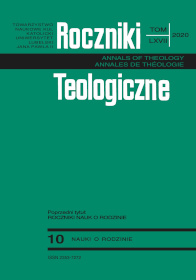Family Values of Contemporary Ukrainian Youth in Across-Cultural Context
Abstract
Family transformations in different countries have both common tendencies and differences that are reflected in young people’s perceptions of the family and family values. The article purpose is to analyse the family values of contemporary Ukrainian youth, taking into account the cross-cultural context.
The performed analysis shows the similarity of family development trends in Ukraine and other European countries: moving away from the traditional family model, experimenting with other forms of relationships, postponing marriages and births of children etc., which is reflected in the family values of youth. At the same time, young people believe that an ideal family is rather a family with traditional structures and with a partner-type relationship, but with a certain imbalance in role distribution. The striking differences in family value perceptions characteristic for boys and girls testify to the significant influence of gender stereotypes. Keeping some of the traditional views, Ukrainian youth are actively experimenting with new forms of partnership/family. Young people’s perceptions of the family are contradictory: the idealized traditional model is combined with their willingness to experiments; the focus on partnerships is mixed with gender stereotype influence.
References
Being young in Europe today – family and society (Data extracted in December 2017) https://ec.europa.eu/eurostat/statistics-explained/index.php/Main_Page (accessed: 19.11.2019).
Beck, U., Beck-Gernsheim, E. Miłość na odległość. Warszawa: Wydawnictwo Naukowe PWN, 2018.
Doslidzhennia «Reitynh radosti: serpen 2018», opytuvannia naselennia Ukrainy vid 18 rokiv i starshe. 10-15 lypnia 2018 r.). http://ratinggroup.ua/research/ukraine/reyting_radosti_avgust_2018.html (accessed: 19.11.2019).
Dyczewski, L. “Family and its Place in the Hierarchy of Values in the Young Generation of Europeans (Results of Sociological Studies).” In: The Situation of the Family in Contemporary Society – Experiences of Middle Eastern Europe, 29-45. Lublin: Publishing House of Catholic University of Lublin, 2007.
Kolnik, M., Vojtko, S. “The Contemporary Slovak Family Current State of Research.” In: The Situation of the Family in Contemporary Society – Experiences of Middle Eastern Europe, 62-67. Publishing House of Catholic University of Lublin, 2007.
Kulczyk, J. “Empatia i styl prywiązywania w kontekście bliskich związków młodych dorosłych.” Acta Universitatis Lodziensis. Folia Psychologica (2016), 20: 89-104.
Kwak, A., Bieńko, M. (red.). Wielość spojrzeń na małżeństwo i rodzinę. Warszawa: WUW, 2011.
Martynyk, B. Stalo vidomo, skilky ditei v Ukraini narodzhuiut poza shliubom. URL: http://expres.ua/news/2018/06/13/298032-stalo-vidomo-skilky-ditey-ukrayini-narodzhuyut-poza-shlyubom (accessed: 19.11.2019).
Ministerstvo molodi i sportu Ukrainy. Molod’ Ukrainy – 2015. Kyiv: HFK Yukrein, 2015, https://ukraine.unfpa.org/sites/default/files/pub-pdf/-%202015 (accessed: 19.11.2019).
Molod’ Ukrainy – 2018. Rezultaty reprezentatyvnoho sotsiolohichnoho doslidzhennia. Kyiv: DP, 2018. «Redaktsiia informatsiinoho biuletenia «Ofitsiinyi visnyk Prezydenta Ukrainy», http:// www.dsmsu.gov.ua/media/2019/01/08/9/Doslidjennya_broshyra (accessed: 19.11.2019).
Sedykh, K.V. Psykholohiia vzaiemodii system: «sim’ia ta osvitni instytutsii». Poltava: Dovkillia, 2008.
Shneider, L.B. Semeinaia psykholohyia. Moskva: Mysl, 2005.
Sotsiolohiia kokhannia: yak ukraintsi odruzhuiutsia i chomu rozluchaiutsia. Interv’iu z L. Sliusar, providnym naukovym spivrobitnykom Instytutu demohrafii ta sotsdoslidzhen im. M.V.Ptukhy NANU. URL: https://ukr.segodnya.ua/ukraine/sociologiya-lyubvi-kak-ukraincy-zaklyuchayut-braki-i-pochemu-razvodyatsya-1113755.html (accessed: 19.11.2019).
Statystychna informatsiia shchodo derzhavnoi reiestratsii aktivtsyvilnoho stanu, https://minjust.gov.ua/actual-info/stat_info (accessed: 19.11.2019).
Tereshchenko, M.V. Doshliubni uiavlennia pro simeine zhyttia yak chynnyk podruzhnoho vzaiemorozuminnia. Visnyk psykholohii i sotsialnoi pedahohiky: zbirnyk nauk. prats, Moskva: Instytut psykholohii i sotsialnoi pedahohiky Kyivskoho universytetu im.Borysa Hrinchenka; Moskovskyi humanitarny i pedahohichnyi instytut. Vypusk 1. K., 2009.
Thomson, E., Colelle, U. “Cohabitation and Marital Stability: Quality or Commitment.” Journal of Merriage and the Family (1992), 54: 259-268.
Wyżlic, M., Gorbaniuk, J. “Preferowane modele małżeństwa i rodziny przez młodzież na etapie bliższego i bezpośredniego przygotowania do życia w małżeństwie i rodzinie.” Roczniki Nauk o Rodzinie 2010, 2(57): 191-206.
Yablonska, T.M. Rozvуtok іdentichnostі dуtуnу vsуstemі sіmeynуhvzaеmуn. Sumу: VуdvoSumDPU іm. A.S. Makarenka 2013, https://www.facebook.com/dismp.gov.ua/photos/a.697367453702373/2206156176156819/?type=3&theater (accessed: 19.11.2019).
Copyright (c) 2020 Roczniki Teologiczne

This work is licensed under a Creative Commons Attribution-NonCommercial-NoDerivatives 4.0 International License.





